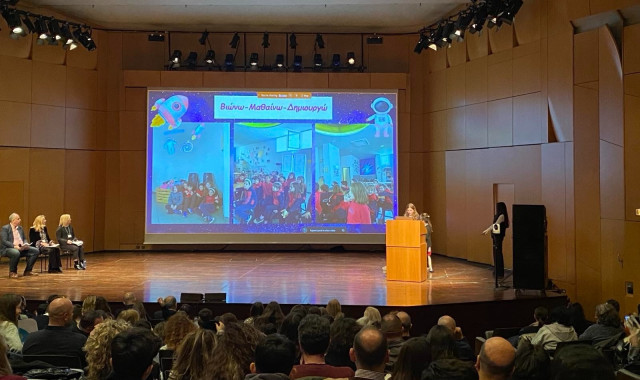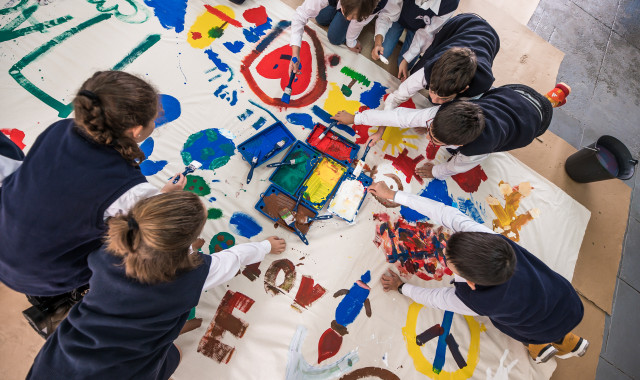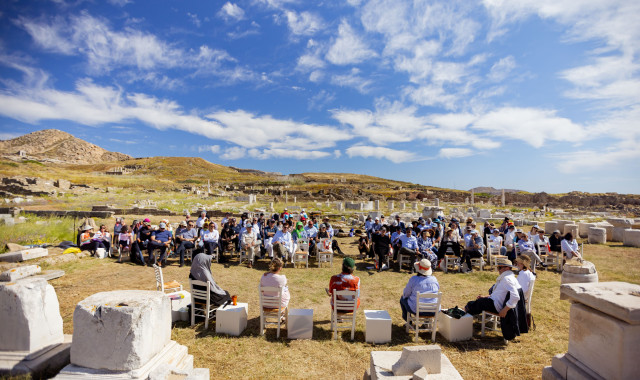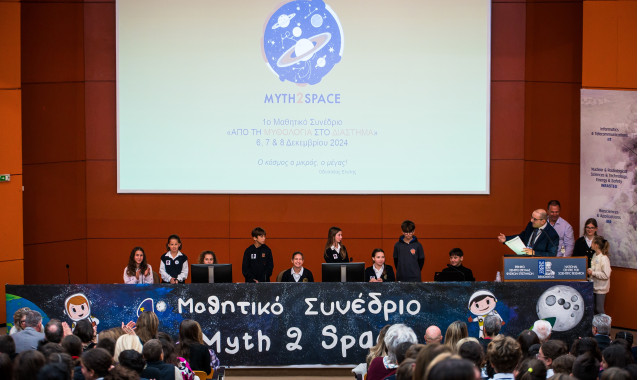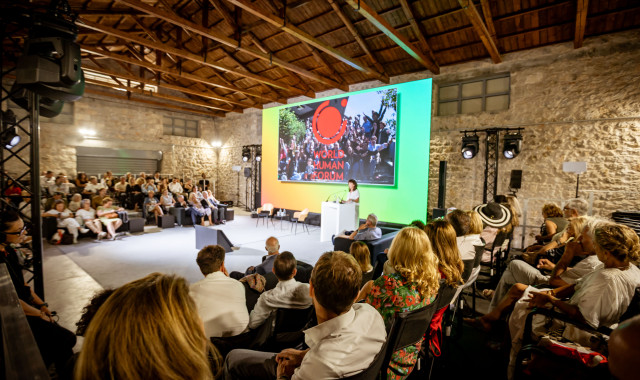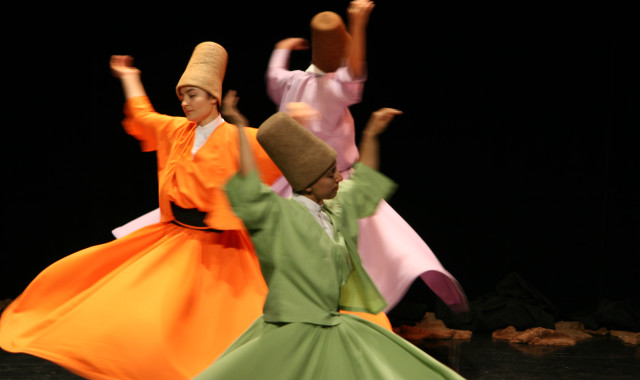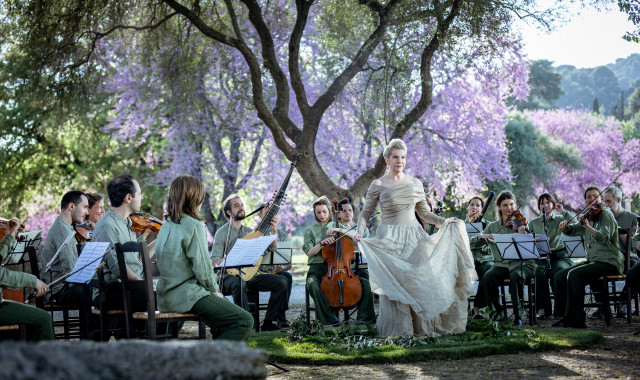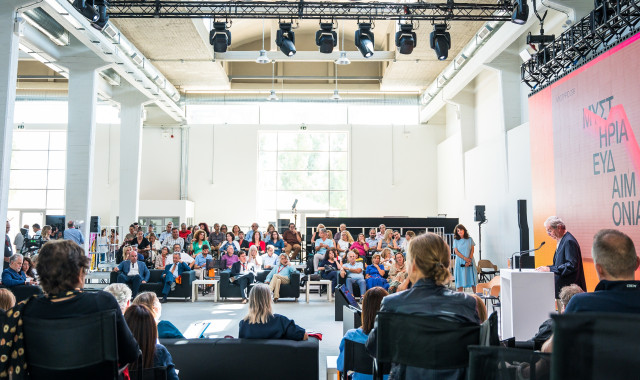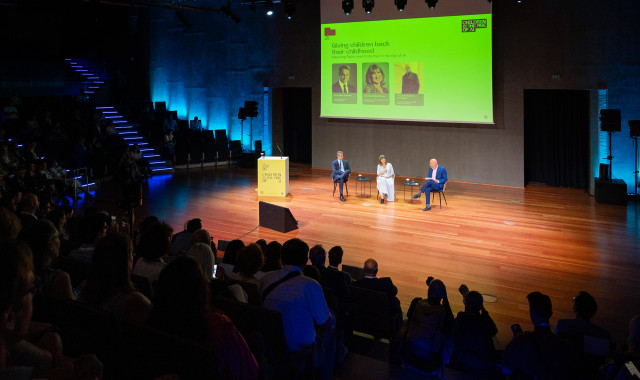What if healing, democracy, and the economy could all be reimagined through art, community, and nature’s wisdom? The 3rd New Eleusis Symposion brought together visionaries from across the world to explore just that — from psychedelic science and circular economies to neighbourhood renewal, mindful work, and the living spirit of Eleusis. Over three transformative days, ideas blossomed, connections deepened, and a shared vision of a re-enchanted world began to take shape. Sessions are now freely available on the World Human Forum YouTube channel — a journey worth revisiting. Ηere is a glimpse into the perspectives and inspirations shared.
3rd New Eleusis Symposium Day 1: 25 September 2025
The opening session Why Re-Enchanting? Why Eleusis? provided both a deep historical foundation and a call to contemporary engagement. Christina Merkouri (Director, Ephorate of Antiquities of West Attica), explored the Eleusinian Mysteries as a profound, transformative experience, rooted in myth, agrarian cults, and inclusive ritual. She highlighted their relevance in addressing modern spiritual, psychological, and ecological concerns. Alexandra Mitsotaki (co-founder and president, World Human Forum) reflected on the journey of the WHF, describing its organic growth and eventual arrival in Eleusis. She framed the symposia as a response to today’s crisis of meaning—spaces designed to bridge personal transformation, community action, and the exchange of ideas, in service of fostering a life-affirming civilisation.
Moderated by Gina Belafonte (artivist and co-founder of Sankofa.org), the panel The Role of Psychedelics explored how psychedelic-assisted therapies are reshaping mental health care, bridging science and spirituality, and offering new paths for healing in an age of disconnection. Anthony P. Bossis (NYU School of Medicine) acknowledged that clinical research on psychedelics is progressing rapidly and emphasised psilocybin’s potential to reduce existential distress in terminal patients through profound — often spiritual — experiences. Christina Dalla (University of Athens) explained how these compounds could affect therapeutically our brain, by enhancing cognitive or psychological flexibility and neuroplasticity. She also called for research into sex and gender differences in psychedelic response. Ornella Corazza (Universities of Trento & Hertfordshire) presented results from studies conducted in Italy emphasising the subjective dimensions of participants’ experiences and their potential for transformation. She called for rigorous clinical trials and greater inclusivity in research design and sampling. Théo Giubilei introduced PsychedeliCare Initiative, a European campaign advocating for safe, legal, and equitable access to psychedelic therapies, research funding, and regulatory reform.
In his keynote, Professor Franz X. Vollenweider (University of Zurich) traced the evolution of psychedelic science from its early roots to current cutting-edge neuroscience. He highlighted how psychedelic substances may transiently dissolve entrenched cognitive and emotional patterns, foster empathy, and deepen introspective self-awareness, cautioning that these substances are not panaceas but potent catalysts for nuanced, long-term psychological transformation when applied with care and responsibility.
Subsequently, Gina Belafonte led an impactful, experiential session on the practice of presence as a foundation for healing and connection.
Opening The arts for healing panel — a teaser for the 4th New Eleusis Symposion Theme “Science, Art & the Spirit of Healing”— , Professor Emeritus of Classical Archaeology Vasilis Lambrinoudakis (University of Athens) highlighted how ancient Greek Asklepieia offered a holistic approach to health, combining ritual, music, dance, architecture, and nature to heal both body and soul. He underscored the role of inclusivity, and the psychological preparation of the patient, offering timeless insights for modern medicine.
Apostolia Papadamakis (Director/ Choreographer, Founder of Anamnesis Participatory Performances) unfolded the journey that led her to create Anamnesis and highlighted how art reconnects us with the sacredness of life and nature, empowering individuals and communities to heal themselves. Nicholas Yatromanolakis (General Director, Policy Lab; Former Deputy Minister of Culture & Sports, Hellenic Republic) presented the cultural prescription programme—a nationwide initiative piloting how cultural institutions can provide prescribed mental health care services. He noted the importance of open-minded policymakers, underlining that real change requires not only vision but also data, evidence, and collaboration. Nikos Tsouchlos (President, Athens Conservatoire; Professor, Department of Music Studies, Ionian University) reflected on his institution’s involvement in the programme and the deeper role of empathy in healing. He concluded that while artists and scientists may take different paths, they share the common goal of healing. Rarita Zbranca (Program Director, Cluj Cultural Centre) shared the Romanian experience with arts-based interventions for mental health, such as group singing for postpartum depression. She observed increasing momentum at the European policy level and suggested that culture’s inclusive potential could play a vital role in addressing the health impacts of social and economic marginalisation.
The day closed with a screening of the film Human Requiem in Eleusis at Cine Eleusis, followed by an award presented to Jochen Sandig, Concept & Artistic Director, and Stephan Talneau, Film Director.
3rd New Eleusis Symposium Day 2: 26 September 2025
The second day began at the archaeological site of Eleusis with an inspiring guided tour led by archaeologist Kalliopi Papangeli and writer-filmmaker Phil Cousineau. This was followed by a performance curated by Claudia Paetzold featuring artist Cecilia Bengolea. The program then continued at the Old Oil Mill Factory of Eleusis with a series of panels on re-enchanting the economy—covering impact investment, circular models, and nature-inspired technologies.
In the first session, Kostis Tselenis (Founder & Chairman of the Board, Hellenic Impact Investing Network) explained how impact investment channels private capital into solutions for social and environmental challenges, offering both profit and purpose. He described how financially viable models—such as renewable energy, alternative plastics, and reforestation—can scale meaningful change and emphasised the urgent need to mobilise capital for nature-based solutions like biodiversity and nature credits. Broader circle speakers also contributed to the discussion. From the government side, Petros Varelidis (Secretary General for Natural Environment and Water, Hellenic Ministry of Environment & Energy) outlined how the state can shape enabling conditions for green investments through regulations and incentive mechanisms, such as super credits for projects with strong nature-positive outcomes. Alexandra Palli (Deputy Regional Governor for Entrepreneurship & European Programming, Region of Attica; Chair, CSR Hellas) reflected on the private sector’s growing need to align with ESG standards, noting that compliance is becoming essential not only for funding access but also for participation in major supply chains. Dora Antonakaki (Bank of Greece) referred to the increasing attention nature is receiving within central banking frameworks, underlining the importance of clear governance and monitoring systems, and calling for a more integrated approach that accounts for both positive impact and negative externalities.
The From Waste to Treasure panel brought together academics, community innovators, and sustainability advocates to explore how circular economy practices can transform waste into resources, and how we can scale these solutions from local experiments to systemic change. Professor Maria Loizidou (National Technical University of Athens) presented her pioneering work on circular bioeconomy and waste-to-energy technologies, emphasising the need for a shift toward bio-refineries that transform organic waste into energy, biofuels, and materials. While she stressed that public awareness is critical, she underlined that it must be supported by infrastructure, logistics, and strong governmental action. Maria Kikidou (Place Identity NGO) described the projects of Mind the Waste which aims to bring participatory methods into local waste reduction and recycling strategies. Through tools like cleanliness regulations, awareness campaigns, and hands-on collaborations with municipalities, she emphasised the need to prioritise reduction and reuse. Professor Yorgos Priniotakis (University of West Attica) focused on the highly polluting textile industry and showcased his innovative research into transforming agricultural and biological waste—like peach byproducts and even human hair—into viable textile fibers. Christiana Gardikioti (Meraki People) shared how she and her team transformed the nearly-abandoned village of Ayannis into a living lab for rural bioeconomy. By using olive branches to grow mushrooms, producing food and biodegradable materials, and involving farmers, and youth, she illustrated a bottom-up model of circularity.
Biomimicry, ancestral intelligence, and regenerative thinking were at the heart of the Re-enchanting the Economy – Inspired by Nature session, moderated by Stefanos Gandolfo (Athens Columbia Global Center). Professor Ruth DeFries (Columbia University) drew on lessons from nature to highlight resilience, emphasising the importance of redundancy and bottom-up organisation. She warned of the vulnerability of global food systems due to dependence on a few species and described biodiversity as vital insurance in times of crisis. Emmanouel I. Stratakis (FORTH; Biomimetic) presented nature as model, measure, and mentor, framing biomimicry as a foundation for innovation grounded in sustainability. He showcased innovation paradigms inspired by cicada wings, coral morphologies, and ancestral intelligence, calling for the integration of technology with the humanities. Vassilis Stenos (Solmeyea) outlined a vision for decarbonising food systems by converting CO₂ into clean, non-GMO protein, stressing biodiversity preservation, algae scalability, and Greece’s emerging role in global food-tech innovation. In her intervention, Desiree Driesenaar (Abundanism) underlined inclusivity and participation in building sustainable, regenerative communities. She highlighted nature-inspired designs like permaculture and edible cities that combine technology, ecology, and economy to create resilient landscapes and circular business models. Mia Sea (Aegis) conveyed insights from shaping EU industrial strategies, advocating biomimicry and biodesign as a shared language across Europe’s diverse cultures and disciplines. She outlined plans for a new institute integrating humanities, science, and startups, positioning nature-inspired design at the heart of the Fifth Industrial Revolution.
In his keynote speech, professor Daniel A. Barber (Technical University of Eindhoven) challenged prevailing ideas of indoor comfort, calling for a shift away from energy-intensive systems toward adaptive, sufficiency-based practices. Through recent projects and research, he highlighted buildings as living collaborators in climate action, advocating for retrofit, reuse, and a reimagined relationship between humans and the built environment. Furthermore, he called for architects to act as agents of decarbonisation—working collectively to reimagine buildings for a post-fossil future.
The next panel shed light on the theme of Re-enchanting Neighborhoods, offering inspiring stories of how local communities can become spaces of transformation, care, and connection. Moderated by Myrto Vounatsou (World Human Forum), the discussion wove together diverse voices and initiatives. Adriana Grigoriou shared how her multicultural background led her to El Sistema Greece, where music serves as a powerful tool for inclusion and empowerment; she also highlighted the Community Arts Network (CAN), which connects those who believe in the arts as a force for change. Angeliki Lampiri drew from her experience with the 2023 Eleusis European Capital of Culture, presenting the Care manifesto—an invitation to rethink community through empathy, support, and shared responsibility. Jacob Moe introduced the Archipelago Network, a project connecting Cycladic island communities through storytelling, shared memory, and the preservation of cultural and environmental knowledge, including maritime traditions. He emphasised how these narratives help maintain neighborhood bonds and support the islands’ transition between old and new worlds. Victoria Peill spoke about WonderHouse in Nairobi, a space for inner transformation and authentic connection, built on radical accessibility and collective creation. Moreover, Yannis Koutoudis presented the work of the Cyclades Preservation Fund, which supports sustainable initiatives in order to generate positive environmental change. Finally, Yannis Sotirakos (founder of EY ZHN LIFE ecosystem) described the “Schools for Life” initiative, which envisions schools as regenerative community hubs—starting with a vibrant summer experiment in the remote village of Vovousa.
The final session of the day, moderated by Jean Gourdain (Eylo), explored Re-enchanting our relationship with food. Professor Antonia Trichopoulou (Academy of Athens) highlighted the Mediterranean diet as a deeply rooted, sustainable way of life. She underscored its global significance for both public health and environmental resilience, drawing on decades of scientific research and policy work. Central to this model, she stressed, is the ethos of local production and seasonal consumption. Chef Maria Loi (Loi Estiatorio; Loi Food Products) recounted her personal evolution from rural Greece to global culinary advocacy, shaped by ancestral knowledge and the Mediterranean approach to living. She presented food as a means of healing, and education—blending heritage with science and media. Jehangir Mehta (Chief Mindfulness Officer, Gourmet Dining; Chef/Owner, Me and You) invited participants to embrace vulnerability, joy, and emotional awareness as pathways to wellbeing. Through humour, mindfulness practices, and human connection, he encouraged small, daily rituals of presence and compassion. The Q&A discussion focused around rising obesity rates, food insecurity, and the importance of systemic change, including early education, accessibility, and affordability.
The day came to a powerful close with the “Mindfulness – Enchanting the Senses” workshop by Jehangir Mehta, followed by the Psychelectronika concert by Superwave.
3rd New Eleusis Symposium Day 3: 27 September 2025
The final day of the Symposion opened with an insightful discussion on Re-enchanting Democracy, moderated by Elina Makri (Democracy & Culture Foundation). Hélène Landemore (Yale University) emphasised that deliberation should be recognised as an essential democratic technology, currently undervalued by governments in favor of limited, often paternalistic consultation processes. She called for greater investment in citizen assemblies, power-sharing methods like sortition, and fostering these practices even within educational systems to deepen citizen participation. Lex Paulson (UM6P School of Collective Intelligence; Sciences Po) pointed out that the natural form of large-scale human government is authoritarian, making democracy fragile and exceptional. Citing the recent “Generation Z revolution” in Nepal, he showed how digital tools empowered youth to organise against elite corruption and install a new technocratic government. He called for urgent, global support of such grassroots movements through diverse, cross-border coalitions. In the Q&A, audience members raised questions about scaling participatory democracy, rethinking civic education, and bridging digital innovation with political institutions. Speakers responded by stressing the importance of cultivating a democratic mindset in everyday interactions, investing in deliberative infrastructure, and forging international, intergenerational alliances to support systemic change.
The panel Children: Humanity’s dream tank brought a series of innovative educational initiatives to the spotlight. Professor Spyros Doukakis (Hellenic Institute of Educational Policy; Ionian University) elaborated on a new curriculum that encourages pupils to learn through real-world, hands-on projects and activities. It is designed to help them discover their skills, think critically, question stereotypes, collaborate, and take ethical, community-focused action — aiming to shape active, responsible, and globally aware citizens. Kostas Chorianopoulos (Primary School Teacher; Myth2Space) described how the Myth2Space educational network began spontaneously in 2023, encouraging holistic learning to cultivate critical thinking and active citizenship among pupils. He shared how 21,000 students from 900 schools have collaborated through projects on themes such as climate change and ancestral intelligence, promoting inclusion, creativity, and democratic participation in the classroom. Marianne Poncelet (International Yehudi Menuhin Foundation) presented the Foundation’s Music Programme, now expanding to Greece, which unites children, artists, and teachers to inspire creativity, beauty, and a renewed sense of wonder through the arts. She, also, explained the Green Tales project, which connects children across Europe through digital art and animation to foster environmental awareness, and announced the forthcoming Blue Tales initiative. Sophie Dand (Eden Engagement) spoke about how the Eden Engagement project linked youth choirs worldwide through workshops combining music, art, and environmental awareness to reconnect young people with nature. She pointed out the power of collective singing to nurture belonging, hope, and a sense of responsibility for the planet among children. Victoria Peill explained how the Duara network empowers teachers across Africa to become educational entrepreneurs, creating community-rooted microschools that expand access to quality learning. She accentuated shifting education from top-down control to local trust and agency, where teachers and parents collaborate to build vibrant, inclusive learning communities. The session was moderated by Alexandra Mitsotaki, who introduced the pioneering work of Kiran Bir Sethi, founder of Design for Change, shared news on the World Human Forum’s 2026 activity in the field of education, and announced that next year Athens will host the Design for Change Global Gathering.
Opening the session Transforming Work in order to Re-enchant the World, keynote speaker Gary A. Bolles (Global Fellow for Transformation, Singularity University) encouraged participants to redesign their relationship with work by blending mindset, skill set, and tool set, with an emphasis on self-knowledge and continual growth. He highlighted a new approach—especially among younger generations—of prioritising purpose and impact, not merely pay or status, in shaping a fulfilling professional path. Dancer Amélie Joannidѐs spoke about rediscovering purpose after losing her sense of meaning and identity, describing how reconnecting with the deeper human need for dance and expression helped her transform and find authenticity again. Soprano Marlis Petersen shared her own journey through burnout and loss of voice, realising it was her soul calling for change; through reconnecting with nature and new creative practices, she found healing and a renewed sense of self, reminding the audience to listen to their inner voice and allow time for transformation.
Following the Moving and reconnecting with our inner being: A path through the body workshop with Amélie Joannidѐs, Irini Papaligouras-Bataille (World Human Forum) welcomed us to the session Re-enchanting your inner self. She introduced the concept of “acidia” —loss of care— and discussed how tools such as the IVI model and Inner Development Goals can guide personal transformation, helping us move from stagnation to flourishing (“olvos”).
In the Art of Pilgrimage session, Phil Cousineau (writer, filmmaker) spoke of pilgrimage as both an outer and inner journey—a sacred quest that transforms those who embark on it. He urged Eleusis to reclaim its heritage as a modern centre of pilgrimage, calling on people to seek meaning through movement, reflection, and spiritual renewal.
The two final panels of the symposion were dedicated to The Future of Eleusis. Part A, A vision for the City, examined how to sustain and expand the city’s transformation, following its designation as European Capital of Culture 2023. Michail Marmarinos (Artistic Director, Athens Epidaurus Festival; General Artistic Director, Eleusis 2023) described that the programme of 2023 Eleusis was inspired by processions and divine epiphanies, that embody Elefsina’s timeless spirit. He emphasised the importance of lasting legacy, collaboration and civic continuity beyond political cycles. Christina Kefalogianni (Deputy Regional Governor of Attica) outlined the Region’s “Attica Trilogy” project, connecting Elefsina, Athens and Lavrio, to stimulate cultural regeneration and touristic reevaluation of Attica. She promoted a vision where heritage and innovation coexist and supported the idea, introduced by Alexandra Mitsotaki, to explore the recognition of the Eleusinian Mysteries as part of UNESCO’s Cultural Heritage of Humanity. Alexandra Mitsotaki underlined Elefsina’s spiritual and symbolic significance in addressing humanity’s crisis of meaning. She reaffirmed the Forum’s commitment to long-term projects engaging the local community, envisioning Elefsina as a living social laboratory for bottom-up change, partnerships and cultural renewal. Titled Rekindling the spirit of the place the last session brought Emeritus Professor Pavlos Kavouras (UNESCO Chair on Intangible Cultural Heritage) into conversation with Alexandra Mitsotaki on the spiritual core of the 3rd New Eleusis Symposion “Re-enchanting the World”. Kavouras spoke of enchantment as an awakening of awe and consciousness that transcends ego and reconnects humanity with nature and community, emphasising inner development as the missing link for true transformation.
True to the spirit of the gathering, the day closed with a powerful experience of artistic and spiritual symbiosis at the archaeological site of Eleusis — the sold-out performance “Sacred Paths” featuring the Mevlevi Dervishes of Istanbul, the Byzantine Choir of the Association of the Constantinopolitan Friends of Music in Athens, Sokratis Sinopoulos, master of the lyra, and acclaimed director Michail Marmarinos as narrator. The performance captivated audiences both at Eleusis and later at Megaron – The Athens Concert Hall, where it also earned warm applause.

